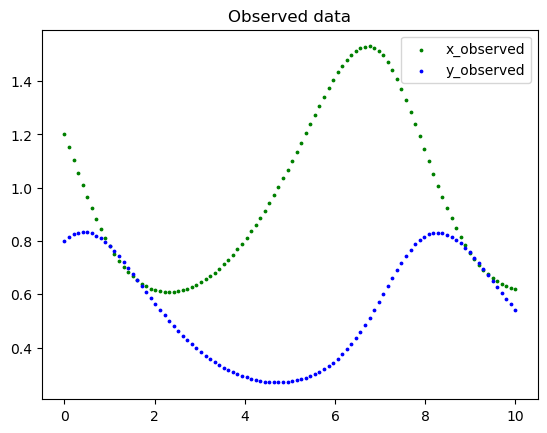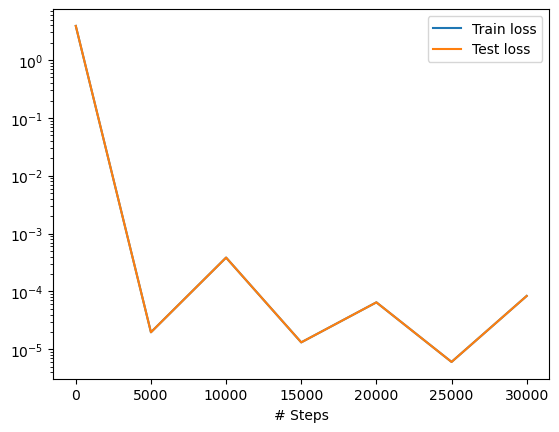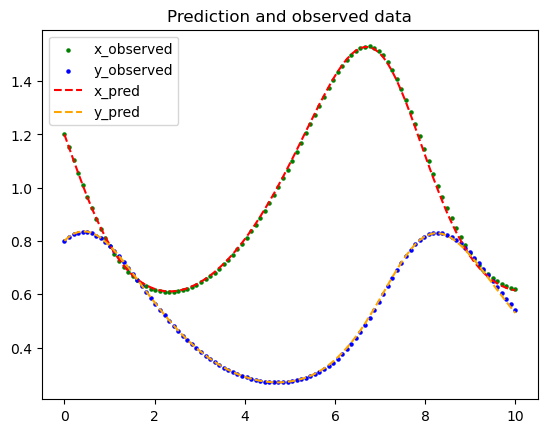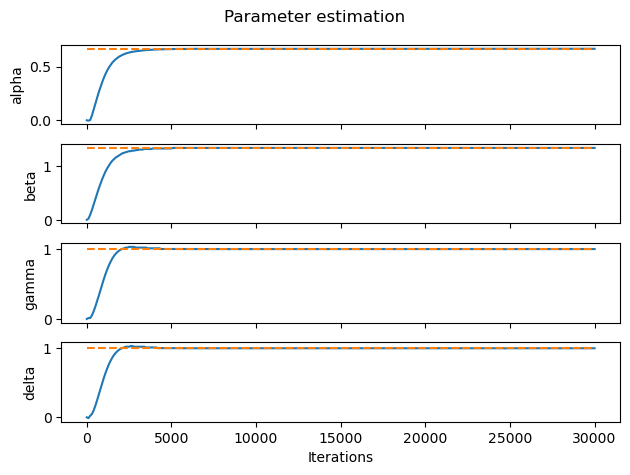Parameter Estimation#
Now, let’s consider another scenario. Imagine another researcher sampled data every day, \(x_{observed} = (x(t_1), x(t_2) , \ldots, x(t_n))\) and \(y_{observed} = (y(t_1), y(t_2) , \ldots, y(t_n))\) where \(t_1, t_2, \ldots, t_n\) represents time. The goal here is to determine the best values \(\alpha\), \(\beta\), \(\gamma\) and \(\delta\) for this sampled data. $\( \dfrac{dx}{dt} = \alpha x - \beta xy \\ \dfrac{dy}{dt} = -\gamma y + \delta xy \)$ This is called an Inverse Problem but some authors also called this sort of approaches as Data-Driven Discovery. We will use PINNs for this purpose and you will notice we only need to add some extra features compared to the last lesson.
import re
import numpy as np
import matplotlib.pyplot as plt
import deepxde as dde
from scipy.integrate import solve_ivp
from deepxde.backend import tf
Using backend: tensorflow.compat.v1
2023-05-29 15:06:47.897341: I tensorflow/core/platform/cpu_feature_guard.cc:193] This TensorFlow binary is optimized with oneAPI Deep Neural Network Library (oneDNN) to use the following CPU instructions in performance-critical operations: AVX2 AVX512F AVX512_VNNI AVX512_BF16 FMA
To enable them in other operations, rebuild TensorFlow with the appropriate compiler flags.
2023-05-29 15:06:48.118069: I tensorflow/core/util/port.cc:104] oneDNN custom operations are on. You may see slightly different numerical results due to floating-point round-off errors from different computation orders. To turn them off, set the environment variable `TF_ENABLE_ONEDNN_OPTS=0`.
2023-05-29 15:06:48.918396: W tensorflow/compiler/xla/stream_executor/platform/default/dso_loader.cc:64] Could not load dynamic library 'libnvinfer.so.7'; dlerror: libnvinfer.so.7: cannot open shared object file: No such file or directory; LD_LIBRARY_PATH: :/home/alonsolml/mambaforge/envs/nc-book/lib/
2023-05-29 15:06:48.920012: W tensorflow/compiler/xla/stream_executor/platform/default/dso_loader.cc:64] Could not load dynamic library 'libnvinfer_plugin.so.7'; dlerror: libnvinfer_plugin.so.7: cannot open shared object file: No such file or directory; LD_LIBRARY_PATH: :/home/alonsolml/mambaforge/envs/nc-book/lib/
2023-05-29 15:06:48.920018: W tensorflow/compiler/tf2tensorrt/utils/py_utils.cc:38] TF-TRT Warning: Cannot dlopen some TensorRT libraries. If you would like to use Nvidia GPU with TensorRT, please make sure the missing libraries mentioned above are installed properly.
WARNING:tensorflow:From /home/alonsolml/mambaforge/envs/nc-book/lib/python3.10/site-packages/tensorflow/python/compat/v2_compat.py:107: disable_resource_variables (from tensorflow.python.ops.variable_scope) is deprecated and will be removed in a future version.
Instructions for updating:
non-resource variables are not supported in the long term
Enable just-in-time compilation with XLA.
2023-05-29 15:06:50.021137: I tensorflow/compiler/xla/stream_executor/cuda/cuda_gpu_executor.cc:967] could not open file to read NUMA node: /sys/bus/pci/devices/0000:01:00.0/numa_node
Your kernel may have been built without NUMA support.
2023-05-29 15:06:50.056924: I tensorflow/compiler/xla/stream_executor/cuda/cuda_gpu_executor.cc:967] could not open file to read NUMA node: /sys/bus/pci/devices/0000:01:00.0/numa_node
Your kernel may have been built without NUMA support.
2023-05-29 15:06:50.056966: I tensorflow/compiler/xla/stream_executor/cuda/cuda_gpu_executor.cc:967] could not open file to read NUMA node: /sys/bus/pci/devices/0000:01:00.0/numa_node
Your kernel may have been built without NUMA support.
WARNING:tensorflow:From /home/alonsolml/mambaforge/envs/nc-book/lib/python3.10/site-packages/deepxde/nn/initializers.py:118: The name tf.keras.initializers.he_normal is deprecated. Please use tf.compat.v1.keras.initializers.he_normal instead.
Training Data#
The train data will be generated by ourserlves, so we will have a better understading of the error. Let’s choose a time interval, initial conditions and parameters.
t_initial, t_final = 0, 10 # Equivalent to 10 days
x0 = 1.2
y0 = 0.8
alpha_real = 2 / 3
beta_real = 4 / 3
gamma_real = 1
delta_real = 1
parameters_real = {
"alpha": alpha_real,
"beta": beta_real,
"gamma": gamma_real,
"delta": delta_real
} # We will use this later for study errors
We can use a similar approach than last module for generate synthetic data, this will allows us to study errors.
def generate_data(
t,
x0,
y0,
alpha,
beta,
gamma,
delta
):
def func(t, Y):
x, y = Y
dx_dt = alpha * x - beta * x * y
dy_dt = - gamma * y + delta * x * y
return dx_dt, dy_dt
Y0 = [x0, y0]
t = t.flatten()
t_span = (t[0], t[-1])
sol = solve_ivp(func, t_span, Y0, t_eval=t)
return sol.y.T
Generate the synthetic data and plot it.
t_train = np.linspace(t_initial, t_final, 100).reshape(-1, 1)
Y_train = generate_data(t_train, x0, y0, alpha_real, beta_real, gamma_real, delta_real)
x_train = Y_train[:, 0:1]
y_train = Y_train[:, 1:2]
plt.scatter(t_train, x_train, color="green", s=3, label="x_observed")
plt.scatter(t_train, y_train, color="blue", s=3, label="y_observed")
plt.legend()
plt.title("Observed data")
plt.show()

PINNs Data-Driven Discovery#
Now we will forget for a minute about the real values of \(\alpha\), \(\beta\), \(\gamma\) and \(\delta\) since the goal of this lesson is to learn how to estimate these parameters. Let’s start defining them in a way that our code knows they have to be learned.
# Pick some initial guess
alpha = dde.Variable(0.0)
beta = dde.Variable(0.0)
gamma = dde.Variable(0.0)
delta = dde.Variable(0.0)
Now we have to define the residuals and initial conditions in the same way the forward approximation (previous module).
def ode(t, Y):
x = Y[:, 0:1]
y = Y[:, 1:2]
dx_dt = dde.grad.jacobian(Y, t, i=0)
dy_dt = dde.grad.jacobian(Y, t, i=1)
return [
dx_dt - alpha * x + beta * x * y,
dy_dt + gamma * y - delta * x * y
]
And also geometry and initial conditions
geom = dde.geometry.TimeDomain(t_initial, t_final)
def boundary(_, on_initial):
return on_initial
ic_x = dde.icbc.IC(geom, lambda x: x0, boundary, component=0)
ic_y = dde.icbc.IC(geom, lambda x: y0, boundary, component=1)
We can use the observed data t_train and Y_train, which are equivalent to \(x_{observed} = (x(t_1), x(t_2) , \ldots, x(t_n))\) and \(y_{observed} = (y(t_1), y(t_2) , \ldots, y(t_n))\) for learning the values of our parameters. So we need to declare a new object and then include it to our model.
observe_x = dde.icbc.PointSetBC(t_train.reshape(-1, 1), Y_train[:, 0:1], component=0)
observe_y = dde.icbc.PointSetBC(t_train.reshape(-1, 1), Y_train[:, 1:2], component=1)
Be careful! Note that component=0 is associated with the variable \(x\) every time, defining the gradients, initial conditions and observed data. Same for component=1 which corresponds to the variable \(y\).
The data object is similar but we include the observed data as well in the list of conditions. But also note that we can add the observed data as train points with the argument anchors.
data = dde.data.PDE(
geom,
ode,
[ic_x, ic_y, observe_x, observe_y],
num_domain=512,
num_boundary=2,
anchors=t_train,
)
Now we can define our neural network
neurons = 64
layers = 6
activation = "tanh"
initializer = "Glorot normal"
net = dde.nn.FNN([1] + [neurons] * layers + [2], activation, initializer)
Training#
This step is also similar, except we have to tell our model it has to learn external variables (\(\alpha\), \(\beta\), \(\gamma\) and \(\delta\)) using external_trainable_variables.
model = dde.Model(data, net)
model.compile(
"adam",
lr=0.001,
external_trainable_variables=[alpha, beta, gamma, delta]
)
Compiling model...
Warning: For the backend tensorflow.compat.v1, `external_trainable_variables` is ignored, and all trainable ``tf.Variable`` objects are automatically collected.
Building feed-forward neural network...
'build' took 0.043011 s
/home/alonsolml/mambaforge/envs/nc-book/lib/python3.10/site-packages/deepxde/nn/tensorflow_compat_v1/fnn.py:103: UserWarning: `tf.layers.dense` is deprecated and will be removed in a future version. Please use `tf.keras.layers.Dense` instead.
return tf.layers.dense(
2023-05-29 15:06:51.032478: I tensorflow/core/platform/cpu_feature_guard.cc:193] This TensorFlow binary is optimized with oneAPI Deep Neural Network Library (oneDNN) to use the following CPU instructions in performance-critical operations: AVX2 AVX512F AVX512_VNNI AVX512_BF16 FMA
To enable them in other operations, rebuild TensorFlow with the appropriate compiler flags.
2023-05-29 15:06:51.033856: I tensorflow/compiler/xla/stream_executor/cuda/cuda_gpu_executor.cc:967] could not open file to read NUMA node: /sys/bus/pci/devices/0000:01:00.0/numa_node
Your kernel may have been built without NUMA support.
2023-05-29 15:06:51.033911: I tensorflow/compiler/xla/stream_executor/cuda/cuda_gpu_executor.cc:967] could not open file to read NUMA node: /sys/bus/pci/devices/0000:01:00.0/numa_node
Your kernel may have been built without NUMA support.
2023-05-29 15:06:51.033942: I tensorflow/compiler/xla/stream_executor/cuda/cuda_gpu_executor.cc:967] could not open file to read NUMA node: /sys/bus/pci/devices/0000:01:00.0/numa_node
Your kernel may have been built without NUMA support.
2023-05-29 15:06:51.843256: I tensorflow/compiler/xla/stream_executor/cuda/cuda_gpu_executor.cc:967] could not open file to read NUMA node: /sys/bus/pci/devices/0000:01:00.0/numa_node
Your kernel may have been built without NUMA support.
2023-05-29 15:06:51.843943: I tensorflow/compiler/xla/stream_executor/cuda/cuda_gpu_executor.cc:967] could not open file to read NUMA node: /sys/bus/pci/devices/0000:01:00.0/numa_node
Your kernel may have been built without NUMA support.
2023-05-29 15:06:51.843966: I tensorflow/core/common_runtime/gpu/gpu_device.cc:1700] Could not identify NUMA node of platform GPU id 0, defaulting to 0. Your kernel may not have been built with NUMA support.
2023-05-29 15:06:51.844002: I tensorflow/compiler/xla/stream_executor/cuda/cuda_gpu_executor.cc:967] could not open file to read NUMA node: /sys/bus/pci/devices/0000:01:00.0/numa_node
Your kernel may have been built without NUMA support.
2023-05-29 15:06:51.844016: W tensorflow/core/common_runtime/gpu/gpu_bfc_allocator.cc:42] Overriding orig_value setting because the TF_FORCE_GPU_ALLOW_GROWTH environment variable is set. Original config value was 0.
2023-05-29 15:06:51.844075: I tensorflow/core/common_runtime/gpu/gpu_device.cc:1613] Created device /job:localhost/replica:0/task:0/device:GPU:0 with 7369 MB memory: -> device: 0, name: NVIDIA GeForce RTX 3080, pci bus id: 0000:01:00.0, compute capability: 8.6
'compile' took 1.173493 s
In order to study the convergence of the learning process related to the parameters we want to estimate we need a separate file where we can store these estimations. The file variables.dat will store ours estimations of \(\alpha\), \(\beta\), \(\gamma\) and \(\delta\) each 100 iterations.
variable = dde.callbacks.VariableValue(
[alpha, beta, gamma, delta],
period=100,
filename="variables.dat"
)
Do not forget to add this variable in the training process using callbacks=[variable].
losshistory, train_state = model.train(iterations=30000, display_every=5000, callbacks=[variable])
dde.utils.external.plot_loss_history(losshistory)
Initializing variables...
Training model...
2023-05-29 15:06:52.181256: I tensorflow/compiler/mlir/mlir_graph_optimization_pass.cc:357] MLIR V1 optimization pass is not enabled
2023-05-29 15:06:52.307510: I tensorflow/compiler/xla/service/service.cc:173] XLA service 0x7f3408005f60 initialized for platform CUDA (this does not guarantee that XLA will be used). Devices:
2023-05-29 15:06:52.307575: I tensorflow/compiler/xla/service/service.cc:181] StreamExecutor device (0): NVIDIA GeForce RTX 3080, Compute Capability 8.6
2023-05-29 15:06:52.333523: I tensorflow/compiler/mlir/tensorflow/utils/dump_mlir_util.cc:268] disabling MLIR crash reproducer, set env var `MLIR_CRASH_REPRODUCER_DIRECTORY` to enable.
2023-05-29 15:06:52.670204: I tensorflow/tsl/platform/default/subprocess.cc:304] Start cannot spawn child process: Permission denied
2023-05-29 15:06:52.786905: I tensorflow/compiler/jit/xla_compilation_cache.cc:477] Compiled cluster using XLA! This line is logged at most once for the lifetime of the process.
2023-05-29 15:06:53.572711: I tensorflow/compiler/xla/stream_executor/cuda/cuda_blas.cc:630] TensorFloat-32 will be used for the matrix multiplication. This will only be logged once.
Step Train loss Test loss Test metric
0 [4.21e-03, 7.55e-05, 1.44e+00, 6.40e-01, 1.44e+00, 3.71e-01] [4.21e-03, 7.55e-05, 1.44e+00, 6.40e-01, 1.44e+00, 3.71e-01] []
5000 [4.94e-06, 4.39e-06, 3.92e-09, 5.18e-09, 7.28e-06, 3.13e-06] [4.94e-06, 4.39e-06, 3.92e-09, 5.18e-09, 7.28e-06, 3.13e-06] []
10000 [1.65e-04, 3.03e-05, 9.21e-06, 1.01e-06, 1.18e-04, 6.22e-05] [1.65e-04, 3.03e-05, 9.21e-06, 1.01e-06, 1.18e-04, 6.22e-05] []
15000 [2.32e-06, 2.47e-06, 1.64e-07, 8.56e-07, 5.56e-06, 1.83e-06] [2.32e-06, 2.47e-06, 1.64e-07, 8.56e-07, 5.56e-06, 1.83e-06] []
20000 [1.67e-05, 2.35e-06, 2.66e-08, 5.26e-06, 2.30e-05, 1.76e-05] [1.67e-05, 2.35e-06, 2.66e-08, 5.26e-06, 2.30e-05, 1.76e-05] []
25000 [1.42e-06, 1.38e-06, 2.70e-08, 2.94e-08, 2.10e-06, 1.10e-06] [1.42e-06, 1.38e-06, 2.70e-08, 2.94e-08, 2.10e-06, 1.10e-06] []
30000 [9.16e-06, 2.04e-06, 6.90e-08, 7.73e-07, 5.20e-05, 1.97e-05] [9.16e-06, 2.04e-06, 6.90e-08, 7.73e-07, 5.20e-05, 1.97e-05] []
Best model at step 25000:
train loss: 6.06e-06
test loss: 6.06e-06
test metric: []
'train' took 41.995679 s

We can plot the data as well but it is not the main point of this lesson.
plt.scatter(t_train, x_train, color="green", s=5, label="x_observed")
plt.scatter(t_train, y_train, color="blue", s=5, label="y_observed")
sol_pred = model.predict(t_train.reshape(-1, 1))
x_pred = sol_pred[:, 0:1]
y_pred = sol_pred[:, 1:2]
plt.plot(t_train, x_pred, color="red", linestyle="dashed", label="x_pred")
plt.plot(t_train, y_pred, color="orange", linestyle="dashed", label="y_pred")
plt.legend()
plt.title("Prediction and observed data")
plt.show()

Learning History#
We need to open the file variables.dat and create arrays for each parameter. Do not worry about the next piece of code, it will only return a dictionary where keys are the name of the parameters and values are their learning history.
lines = open("variables.dat", "r").readlines()
raw_parameters_pred_history = np.array(
[
np.fromstring(
min(re.findall(re.escape("[") + "(.*?)" + re.escape("]"), line), key=len),
sep=",",
)
for line in lines
]
)
iterations = [int(re.findall("^[0-9]+", line)[0]) for line in lines]
parameters_pred_history = {
name: raw_parameters_pred_history[:, i]
for i, name in enumerate(parameters_real.keys())
}
parameters_pred_history.keys()
dict_keys(['alpha', 'beta', 'gamma', 'delta'])
n_callbacis, n_variables = raw_parameters_pred_history.shape
fig, axes = plt.subplots(nrows=n_variables, sharex=True)
for ax, (parameter, parameter_value) in zip(axes, parameters_real.items()):
ax.plot(iterations, parameters_pred_history[parameter] , "-")
ax.plot(iterations, np.ones_like(iterations) * parameter_value, "--")
ax.set_ylabel(parameter)
ax.set_xlabel("Iterations")
fig.suptitle("Parameter estimation")
fig.tight_layout()

It took less than 5000 iterations to get a really good approximation for each variable! Now we can calculate the relative error for each parameter since we already know the real value.
alpha_pred, beta_pred, gamma_pred, delta_pred = variable.value
print(f"alpha - real: {alpha_real:4f} - predicted: {alpha_pred:4f} - relative error: {np.abs((alpha_real - alpha_pred) / alpha_real):4f}")
print(f"beta - real: {beta_real:4f} - predicted: {beta_pred:4f} - relative error: {np.abs((beta_real - beta_pred) / beta_real):4f}")
print(f"gamma - real: {gamma_real:4f} - predicted: {gamma_pred:4f} - relative error: {np.abs((gamma_real - gamma_pred) / gamma_real):4f}")
print(f"delta - real: {delta_real:4f} - predicted: {delta_pred:4f} - relative error: {np.abs((delta_real - delta_pred) / delta_real):4f}")
alpha - real: 0.666667 - predicted: 0.665072 - relative error: 0.002392
beta - real: 1.333333 - predicted: 1.330057 - relative error: 0.002457
gamma - real: 1.000000 - predicted: 0.999335 - relative error: 0.000665
delta - real: 1.000000 - predicted: 0.998157 - relative error: 0.001843

